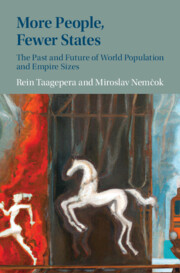Book contents
- More People, Fewer States
- More People, Fewer States
- Copyright page
- Contents
- Figures
- Tables
- Preface
- 1 More People and Yet Fewer States
- Part I World Population Growth
- Part II Empire Growth
- 4 From Populations to Empires and the Role of Technology
- 5 Empires
- 6 Talkers, Doers, Regulators, and Followers
- 7 From Pecking Order to Political Order
- 8 Runner Empires (−3000 to −600)
- 9 Early Rider Empires (−600 to +600)
- 10 An Apparent Dead End
- 11 Stirrup Empires (600 to 1200)
- 12 The Last Rider Empires (1200 to 1800)
- 13 Engineer Empires (From 1800 Onward)
- Part III Trends and Interactions
- Book Appendix: Chronological Table of Major State Sizes, −3500 to +2025
- References
- Index
7 - From Pecking Order to Political Order
from Part II - Empire Growth
Published online by Cambridge University Press: 21 June 2024
- More People, Fewer States
- More People, Fewer States
- Copyright page
- Contents
- Figures
- Tables
- Preface
- 1 More People and Yet Fewer States
- Part I World Population Growth
- Part II Empire Growth
- 4 From Populations to Empires and the Role of Technology
- 5 Empires
- 6 Talkers, Doers, Regulators, and Followers
- 7 From Pecking Order to Political Order
- 8 Runner Empires (−3000 to −600)
- 9 Early Rider Empires (−600 to +600)
- 10 An Apparent Dead End
- 11 Stirrup Empires (600 to 1200)
- 12 The Last Rider Empires (1200 to 1800)
- 13 Engineer Empires (From 1800 Onward)
- Part III Trends and Interactions
- Book Appendix: Chronological Table of Major State Sizes, −3500 to +2025
- References
- Index
Summary
Authority means the ability to affect others’ behavior without applying direct force. Its traces, noted among chimpanzees, develop among the “talking apes.” Human tribes may develop shamans even earlier than full-time chiefs. The advent of agriculture increased population density, enabling ambitious chiefs to have more sway over villagers than they could over sparse hunters: Land tillers are easy to locate and cannot abandon their fields even when hard pressed. A population density of five persons per square kilometer may be the threshold for state formation. Formation of the first states witnessed ferociousness rare in the present humans – or chimpanzees. Tool making shifted gatherers to hunting, and hunting skills may have selected for the most ferocious genes. Agriculture might have started an opposite process of self-taming that still continues, but meanwhile tribal freewheeling turned into utter regimentation, as if the state were the ruler’s household (oikos) and other people his slaves. This human self-domestication reached its fullest extent when the advent of money allowed humans to be sold and bought.
- Type
- Chapter
- Information
- More People, Fewer StatesThe Past and Future of World Population and Empire Sizes, pp. 89 - 102Publisher: Cambridge University PressPrint publication year: 2024

